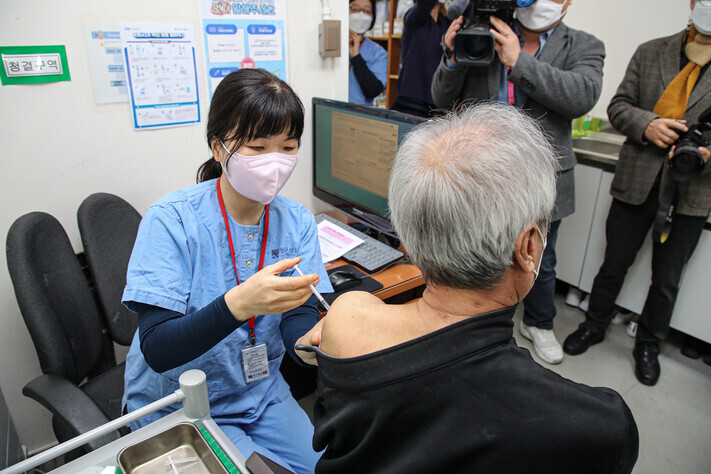hankyoreh
Links to other country sites 다른 나라 사이트 링크
Why have only 9.4% of Koreans have received a COVID-19 booster shot?

As the COVID-19 situation in South Korea worsens, with more than 7,000 new cases reported for three consecutive days, the nation’s booster inoculation rate turns out to be the lowest among the world’s leading countries.
Korea’s Central Disease Control Headquarters announced that as of the end of the day on Thursday, 4,843,497 people had received their COVID-19 booster shot (a third round of vaccination), accounting for 9.4% of the total population. That means that 11% of the population aged 11 and above and 28.5% of the population eligible for booster shots through Dec. 31 have completed their vaccination course.
Korea has one of the lowest booster inoculation rates of the world’s major countries. According to Our World in Data, an international statistics website, Israel had the highest rate of booster inoculation among major economies, at 44.18%, as of Monday. Israel was followed by the UK (30.66%), Germany (17.55%), France (15.23%), Italy (15.19%) and the US (14.39%).
The reason provided for Korea’s low booster uptake is the fact that Korea began its main vaccination campaign (the first two rounds of vaccination) later than those countries. While the world’s major countries began vaccinating their populations around the end of last year, Koreans didn’t start getting the jab until February. The Korean government expects the booster inoculation rate to go up since the share of the population that’s eligible for boosters is rapidly increasing.
But some think that raising the booster inoculation rate won’t be easy because of growing concerns about the adverse reactions to COVID-19 vaccines and doubts about their efficacy.
When Hankook Research surveyed 890 adults who have already received at least one vaccine shot late last month (Nov. 26-29), only 70% said they feel positive about booster shots — and that included some who had already gotten their booster shot.
Among the 271 respondents who said they won’t get a booster or are hesitant to do so, 56% said the reason was their concern about adverse reactions to the vaccination. Other reasons provided were the lack of government measures or compensation for adverse reactions (45%), lack of trust in the efficacy of booster shots (44%), adverse reactions that they’d experienced personally or seen their friends or family experience (38%), and the assumption that a booster isn’t needed if you’ve completed your basic vaccination course (28%). Survey respondents were allowed to choose multiple reasons for vaccine hesitancy.
“There are claims that people have lost their lives or experienced complications as a result of adverse reactions to the vaccines, but the government hasn’t provided sufficiently persuasive explanations or the adequate compensation it promised,” said Kim Yoon, professor of health policy and management at Seoul National University.
“The government signaled that the COVID-19 situation would end if everyone just had two shots. In some respects, it hasn’t done enough to provide information about the efficacy and adverse effects of vaccinations,” said Jung Jae-hun, a professor of preventive medicine at Gachon University College of Medicine.
Data released by the Central Disease Control Headquarters show that booster shots are demonstrably effective at preventing critical and fatal cases of COVID-19. Diseases control authorities said Thursday that among those who have received their booster shot, there have been 172 breakthrough infections, one critical case, and no deaths.
By Lee Jae-ho, staff reporter
Please direct questions or comments to [english@hani.co.kr]

Editorial・opinion
![[Column] Samsung’s ‘lost decade’ and Lee Jae-yong’s mismatched chopsticks [Column] Samsung’s ‘lost decade’ and Lee Jae-yong’s mismatched chopsticks](https://flexible.img.hani.co.kr/flexible/normal/500/300/imgdb/original/2024/0512/3017154788490114.jpg) [Column] Samsung’s ‘lost decade’ and Lee Jae-yong’s mismatched chopsticks
[Column] Samsung’s ‘lost decade’ and Lee Jae-yong’s mismatched chopsticks![[Correspondent’s column] The real reason the US is worried about Chinese ‘overcapacity’ [Correspondent’s column] The real reason the US is worried about Chinese ‘overcapacity’](https://flexible.img.hani.co.kr/flexible/normal/500/300/imgdb/original/2024/0510/5217153290112576.jpg) [Correspondent’s column] The real reason the US is worried about Chinese ‘overcapacity’
[Correspondent’s column] The real reason the US is worried about Chinese ‘overcapacity’- [Editorial] Yoon’s gesture at communication only highlights his reluctance to change
- [Editorial] Perilous stakes of Trump’s rhetoric around US troop pullout from Korea
- [Guest essay] Preventing Korean Peninsula from becoming front line of new cold war
- [Column] The state is back — but is it in business?
- [Column] Life on our Trisolaris
- [Editorial] Penalties for airing allegations against Korea’s first lady endanger free press
- [Editorial] Yoon must halt procurement of SM-3 interceptor missiles
- [Guest essay] Maybe Korea’s rapid population decline is an opportunity, not a crisis
Most viewed articles
- 1Seoul’s plan to adopt SM-3 missiles is like wanting a sledgehammer to catch a fly
- 2[Column] Samsung’s ‘lost decade’ and Lee Jae-yong’s mismatched chopsticks
- 3[Correspondent’s column] The real reason the US is worried about Chinese ‘overcapacity’
- 4Korea poised to overtake Taiwan as world’s No. 2 chip producer by 2032
- 560% of young Koreans see no need to have kids after marriage
- 6[Editorial] Yoon’s gesture at communication only highlights his reluctance to change
- 7Yoon voices ‘trust’ in Japanese counterpart, says alliance with US won’t change
- 8Yoon rejects calls for special counsel probes into Marine’s death, first lady in long-awaited presse
- 9S.K.-Japan joint history project to be revived
- 10Former President Roh Tae-woo, mastermind of 1979 military coup, dies at 88